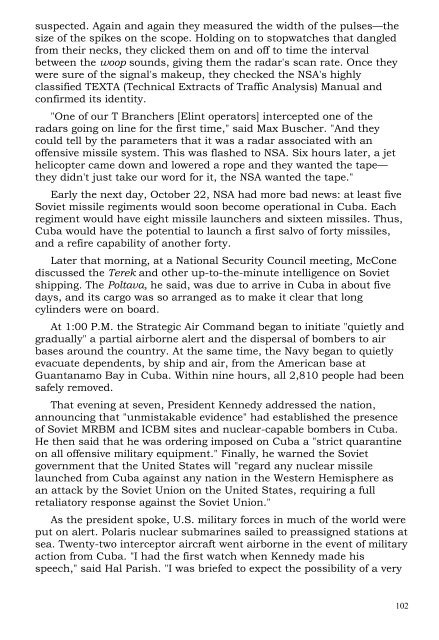- Page 2 and 3:
ACCLAIM FOR JAMES BAMFORD'SBODY OF
- Page 4 and 5:
FIRST ANCHOR BOOKS EDITION, APRIL 2
- Page 6 and 7:
ACKNOWLEDGMENTSMy most sincere than
- Page 9:
CHAPTER ONE MEMORYKVZIEBCEN CKYIECD
- Page 13 and 14:
profile." Nevertheless, he gave his
- Page 15 and 16:
team of American and British codebr
- Page 17 and 18:
called Bletchley Park that the futu
- Page 19 and 20:
Koniginpastete and the russische Ei
- Page 21 and 22:
Germans had departed with such hast
- Page 23 and 24:
without his knowledge," said one TI
- Page 25 and 26:
intercept operators, to handle the
- Page 27 and 28:
developed to divert a single signal
- Page 29 and 30:
in the late forties, and later head
- Page 31 and 32:
Security Agency. Odonovich commande
- Page 33 and 34:
eview. The review then pointed a fi
- Page 35 and 36:
CHAPTER THREE NERVESJFKH WRXSHN WRL
- Page 37:
would keep his ears finely tuned fo
- Page 41:
of pins to mark the hot spots. On J
- Page 44:
cryptanalysis and traffic analysis.
- Page 47 and 48:
needs, and still you cannot shoot d
- Page 49 and 50:
face plate frosted over."Half in an
- Page 51 and 52: and continued its flight deep into
- Page 53 and 54: can say he didn't know about this o
- Page 55 and 56: At 8:40 A.M. on May 24, shortly bef
- Page 57 and 58: eject the investigation. "The speec
- Page 59 and 60: would the President think if there
- Page 61 and 62: such forces to the utmost."In his l
- Page 63 and 64: covered his formal blue uniform and
- Page 65 and 66: General Eisenhower in London and la
- Page 67 and 68: About 2:15, following the swearing-
- Page 69 and 70: possibly in a bomber or bomber trai
- Page 71 and 72: Following Kennedy's order, CIA plan
- Page 73 and 74: near the Windward Passage," said on
- Page 75 and 76: Robert McNamara finally lowered the
- Page 77 and 78: very young people who have been bro
- Page 79 and 80: had a different idea. They proposed
- Page 81 and 82: "sell" the incident.Finally, there
- Page 83 and 84: Because so many documents were dest
- Page 85 and 86: CHAPTER FIVE EYESKPYNTKA' ABPYHTO R
- Page 87 and 88: antenna was installed on its fantai
- Page 89 and 90: sixteen-year-old, he slipped into W
- Page 91 and 92: With the enormous focus on Cuba, Bl
- Page 93 and 94: With the Oxford now in place, the a
- Page 95 and 96: Navy and Air Force operational worl
- Page 97 and 98: the sound barrier. Then you feel it
- Page 99 and 100: adar tracking from radar stations t
- Page 101: Navy ships began leaving port to ge
- Page 105 and 106: the NSA Command Center flashed word
- Page 107 and 108: headquarters, "Havana east, and pos
- Page 109 and 110: noted in the long secret memorandum
- Page 111 and 112: As the Russians began withdrawing,
- Page 113 and 114: wires were strung to pick up the ve
- Page 115 and 116: skipper. We had scuttles fore and a
- Page 117 and 118: would be involved. Vallejo also rei
- Page 119 and 120: the assassination, NSA initiated a
- Page 121 and 122: the "alarming . . . anti-Communist
- Page 123 and 124: (e.g. President Kennedy in October,
- Page 125 and 126: were to break out, Arnold cautioned
- Page 127 and 128: from space, at one point Russian an
- Page 129 and 130: land. Like anthropologists discover
- Page 131 and 132: in Washington.Around the world, on
- Page 133 and 134: able to pick up signals from Soviet
- Page 135 and 136: mobile intercept vans and trucks to
- Page 137 and 138: farmers sipped çay from glass cups
- Page 139 and 140: several days. B-29 raids followed,
- Page 141 and 142: eavesdropping missions near the coa
- Page 143 and 144: They would not let us have autos an
- Page 145 and 146: forgotten dependency of Mauritius,
- Page 147 and 148: said, "which had never been, and ne
- Page 149 and 150: Nearby were two Mark 45 nuclear-tip
- Page 151 and 152: Russians were aggressively searchin
- Page 153 and 154:
nation—the most modern submarine
- Page 155 and 156:
Organization of American States wer
- Page 157 and 158:
States, the Sigint operators on the
- Page 159 and 160:
personnel, six officers and 110 enl
- Page 161 and 162:
Congo), where a U.S. Navy plane wou
- Page 163 and 164:
CHAPTER SEVEN BLOODCYASJA EJLKBJ OJ
- Page 165 and 166:
South America; and the USNS Muller
- Page 167 and 168:
said somewhat quizzically. "You're
- Page 169 and 170:
government intended to protest Egyp
- Page 171 and 172:
Force eavesdropping missions throug
- Page 173 and 174:
journey toward the war zone as the
- Page 175 and 176:
the plane departed, he called up Sc
- Page 177 and 178:
them.As the Liberty sat within eyes
- Page 179 and 180:
Commander Pinchas Pinchasy, the nav
- Page 181 and 182:
shore, thirteen miles away, let alo
- Page 183 and 184:
earliest intelligence that the Russ
- Page 185 and 186:
linguist broke out the white canvas
- Page 187 and 188:
screaming at him probably, and fina
- Page 189 and 190:
despite seeing it on my spectrum an
- Page 191 and 192:
operators, analysts, and communicat
- Page 193 and 194:
to return to Athens. We recorded vo
- Page 195 and 196:
Tordella was told that some senior
- Page 197 and 198:
Black smoke was still escaping thro
- Page 199 and 200:
imposed. Crewmembers were threatene
- Page 201 and 202:
they dealt principally with such to
- Page 203 and 204:
"He asked if a mistake of this sort
- Page 205 and 206:
identified by Israeli military forc
- Page 207 and 208:
information the LIBERTY was interce
- Page 209 and 210:
CHAPTER EIGHT SPINEVGWEQVSM SVWEDQS
- Page 211 and 212:
who would frequently discuss with t
- Page 213 and 214:
was walking quickly up a sidewalk o
- Page 215 and 216:
ecording it. By then the plane was
- Page 217 and 218:
therefore was a special mission as
- Page 219 and 220:
primarily Vladivostok and secondari
- Page 221 and 222:
the seas were calm, the humidity wa
- Page 223 and 224:
From "Venus" to "Mars,"Charley shoo
- Page 225 and 226:
a few things at them and they'll go
- Page 227 and 228:
shore command that he had halted th
- Page 229 and 230:
unning the show at that particular
- Page 231 and 232:
attempt to burn the documents rathe
- Page 233 and 234:
Within days the document would be o
- Page 235 and 236:
enormously secret deliberation. "No
- Page 237 and 238:
indicated that Chinese radar did de
- Page 239 and 240:
"What's your status?! Your function
- Page 241 and 242:
of the Pueblo crew. But for nearly
- Page 243 and 244:
gone. While the Navy shudders and s
- Page 245 and 246:
CHAPTER NINE ADRENALINEI.G. EOPVJEV
- Page 247 and 248:
Vietnam in 1941 disguised as a Chin
- Page 249 and 250:
1961, Vietnam was a wave in the dis
- Page 251 and 252:
several inches deep.Separating the
- Page 253 and 254:
Miguel in the Philippines. Other me
- Page 255 and 256:
hunting. Sitting in front of racks
- Page 257 and 258:
It was an order to attack the ship
- Page 259 and 260:
impending second attack on August 4
- Page 261 and 262:
network was built linking sites at
- Page 263 and 264:
procedures, the formats and numerou
- Page 265 and 266:
such flights," said an NSA report o
- Page 267 and 268:
growing cloud of electrons would fo
- Page 269 and 270:
Walter G. Deeley. "Ground sweeps se
- Page 271 and 272:
morale: he created a photomontage o
- Page 273 and 274:
The Sigint personnel and the rest o
- Page 275 and 276:
the wings, giving the diminutive sp
- Page 277 and 278:
Bailey. "It had such a broad covera
- Page 279 and 280:
dry air and the oxygen they had to
- Page 281 and 282:
Saigon for a one-year tour in Vietn
- Page 283 and 284:
Parks, "was to act as a checkpoint
- Page 285 and 286:
"If SD and SSD [both were Vietcong
- Page 287 and 288:
headquarters was upbeat, like the b
- Page 289 and 290:
hours. After each advance, we would
- Page 291 and 292:
war.Some soldiers who physically su
- Page 293 and 294:
udget. He called them "bureaucrats
- Page 295 and 296:
pilots in Vietnam were being shot d
- Page 297 and 298:
assigned to maintain the Explorer e
- Page 299 and 300:
thing left was Operation Frequent W
- Page 301 and 302:
NSA: 2:07 AM, APRIL 30A PRESIDENTIA
- Page 303 and 304:
THE BUILDING.NSA: 5:48 AMSOUTH VIET
- Page 305 and 306:
CHAPTER TEN FATGTPEX UQLX KQEH TI S
- Page 307 and 308:
Intelligence Activities called NSA
- Page 309 and 310:
know whether I was even allowed to
- Page 311 and 312:
ionization of the chemical mixture.
- Page 313 and 314:
engineer, the mathematical calculat
- Page 315 and 316:
three thousand or thirty-two hundre
- Page 317 and 318:
sunburned desert, corrugated scrubl
- Page 319 and 320:
more like a giant Soviet lake than
- Page 321 and 322:
oom: the sounds were loud and clear
- Page 323 and 324:
profit. Guerin was to work secretly
- Page 325 and 326:
Congress he was the wonder boy, the
- Page 327 and 328:
While most saw only the confident,
- Page 329 and 330:
machine, with its own army, navy, a
- Page 331 and 332:
eventual failure. Angered that his
- Page 333 and 334:
uildings for the Technology and Sys
- Page 335 and 336:
policies and could lead to war. As
- Page 337 and 338:
een one of four people nominated by
- Page 339 and 340:
and many employees sit in front of
- Page 341 and 342:
"Knowledge is power," said Liberal
- Page 343 and 344:
easons." But when a senior GCHQ off
- Page 345 and 346:
Despite the end of the Cold War, th
- Page 347 and 348:
codenamed Echelon.During the 1980s,
- Page 349 and 350:
overtime attempting to log and prog
- Page 351 and 352:
phrases, telephone and fax numbers,
- Page 353 and 354:
sailors on the USS Stark in 1987. C
- Page 355 and 356:
weaponry in unstable regions, and r
- Page 357 and 358:
affected a long-planned trip to Teh
- Page 359 and 360:
market arms sales," said one former
- Page 361 and 362:
ship containing the "special items"
- Page 363 and 364:
to have to spread its resources acr
- Page 365 and 366:
Geneva for the start of the latest
- Page 367 and 368:
with secrecy and power. By then Lou
- Page 369 and 370:
eventually convinced Nixon to drop
- Page 371 and 372:
over as acting FBI director, follow
- Page 373 and 374:
member, would be permitted to be br
- Page 375 and 376:
I countered with the observation th
- Page 377 and 378:
with applicable law. Where the comm
- Page 379 and 380:
In 1994 a forty-seven-page document
- Page 381 and 382:
put her in the category of a full-t
- Page 383 and 384:
terms are used, the context of the
- Page 385 and 386:
which is a U.S. official, the tape
- Page 387 and 388:
Everything."The director ordered an
- Page 389 and 390:
A year after the crash, with comput
- Page 391 and 392:
enemies and allies; a global inform
- Page 393 and 394:
1995, the agency received about 1,5
- Page 395 and 396:
olling out miles and miles of new c
- Page 397 and 398:
were frightening. Within seven year
- Page 399 and 400:
may be programmed in 2001 for a sys
- Page 401 and 402:
will not tell you who called me. I
- Page 403 and 404:
leadership crisis for the better pa
- Page 405 and 406:
to come. These included chief of NS
- Page 407 and 408:
theory the CIA director is responsi
- Page 409 and 410:
2. OBJECTIVE: THE OBJECTIVE OF THIS
- Page 411 and 412:
In a large sense, the changing phil
- Page 413 and 414:
Ranking in size among the top 4.8 p
- Page 415 and 416:
Others have included Harvest; 3000
- Page 417 and 418:
codebreaking and appetite. When the
- Page 419 and 420:
Blue badges are worn by those who h
- Page 421 and 422:
warn "Don't Spill the Beans, Partne
- Page 423 and 424:
hours in the warm sun, the group he
- Page 425 and 426:
Next, on those same days, is an ear
- Page 427 and 428:
mathematician George R. Cotter. He
- Page 429 and 430:
Center, the very heart of NSA's wor
- Page 431 and 432:
was launched, what trajectory it's
- Page 433 and 434:
scientists. They locate important s
- Page 435 and 436:
Inside the offices, some people scr
- Page 437 and 438:
secret version of CNN. As the Defen
- Page 439 and 440:
the CIA's Office of Advanced Projec
- Page 441 and 442:
interest—nuclear weapon transfers
- Page 443 and 444:
shrink its Mount Everest of forbidd
- Page 445 and 446:
various workstations. Then, after c
- Page 447 and 448:
complex of the Cold War, is a cozy
- Page 449 and 450:
At Crypto City's new NSA Graduate S
- Page 451 and 452:
CHAPTER THIRTEEN SOULTRZAV DUZR QYK
- Page 453 and 454:
average NSA manager is more introve
- Page 455 and 456:
stochastic processes and other tech
- Page 457 and 458:
2,000 or so people who applied annu
- Page 459 and 460:
NSA, 78 percent of all information
- Page 461 and 462:
for an independent review of accura
- Page 463 and 464:
machines. "Polygraphing has been de
- Page 465 and 466:
what he called the excellent monito
- Page 467 and 468:
Devon, cutting 250 jobs.As at NSA,
- Page 469 and 470:
satellites were dying of old age an
- Page 471 and 472:
Prettyman retired from her job as c
- Page 473 and 474:
Security Command, it sought "a grou
- Page 475 and 476:
Southern California, who claim to h
- Page 477 and 478:
esearch grants, to mathematicians a
- Page 479 and 480:
In an effort to ease tensions, an O
- Page 481 and 482:
[deputy directors] who were in plac
- Page 483 and 484:
only telephoned the defense attorne
- Page 485 and 486:
world-class organization; NSA is th
- Page 487 and 488:
was king. "Just as control of indus
- Page 489 and 490:
Lieutenant General Ralph Canine. Af
- Page 491 and 492:
high-quality workforce. All of that
- Page 493 and 494:
CHAPTER FOURTEEN BRAINWDLDXTDKS'B A
- Page 495 and 496:
fight he found the contractors less
- Page 497 and 498:
and Engineering but a cocktail part
- Page 499 and 500:
Awarded $25 million by Congress, an
- Page 501 and 502:
Like misers hoarding every last pen
- Page 503 and 504:
Even more powerful, however, was Lo
- Page 505 and 506:
Nicknamed Bubbles, the $17.6 millio
- Page 507 and 508:
As a result of such worries, NSA, w
- Page 509 and 510:
agency named Frostberg. Used until
- Page 511 and 512:
manufacturer of high-performance wo
- Page 513 and 514:
contract, one to upgrade a CRAY T3E
- Page 515 and 516:
University of Maryland's Science an
- Page 517 and 518:
store hundreds of gigabytes of data
- Page 519 and 520:
the 2,500 watts of heat from the sy
- Page 521 and 522:
example, Japan's NEC had made consi
- Page 523 and 524:
AFTERWORD"This is Morning Edition f
- Page 525 and 526:
to the south of Afghanistan, at a l
- Page 527 and 528:
$2,400 each—but were waiting in t
- Page 529 and 530:
By 8:15, the air traffic controller
- Page 531 and 532:
and now president of the University
- Page 533 and 534:
very disturbing live shot there—t
- Page 535 and 536:
controller. "He's in coast track bu
- Page 537 and 538:
a floor and there would be guys fig
- Page 539 and 540:
plane without a transponder was hea
- Page 541 and 542:
O'Brien. "This must be a fighter. T
- Page 543 and 544:
nearby United flight to see if they
- Page 545 and 546:
were a former paratrooper, a brown
- Page 547 and 548:
Steve Mclntyre. "But outside I coul
- Page 549 and 550:
computers, no fax machines, and not
- Page 551 and 552:
drug war. According to NSA official
- Page 553 and 554:
5 May 1985-31 July 1988Vice Admiral
- Page 555 and 556:
555KuwaitiLaoLatvianLevantineLibyan
- Page 557 and 558:
APPENDIX CCRYPTOLOGIC OCCUPATIONS A
- Page 559 and 560:
mathematical methods for the invest
- Page 561 and 562:
NOTESABBREVIATIONS USED IN THE NOTE
- Page 563 and 564:
Nazi Codes (Bri-arcliff Manor, NY:
- Page 565 and 566:
23 "Russia's prejudice": War Depart
- Page 567 and 568:
snippy letter to the National Secur
- Page 569 and 570:
46 "If I could become a missile": i
- Page 571 and 572:
60 "just gobbledy-gook": Beschloss,
- Page 573 and 574:
75 insisted that the choice of Zapa
- Page 575 and 576:
89 "Any of the contrived situations
- Page 577 and 578:
101 "Concentrated efforts have been
- Page 579 and 580:
112 At 1:00 P.M. the Strategic Air
- Page 581 and 582:
123 "All the communications that we
- Page 583 and 584:
Statement on Visa for Oswald," Nove
- Page 585 and 586:
Elmendorf," NCKi Cryptolog (Winter
- Page 587 and 588:
Garcia, "Command Histories, 1973—
- Page 589 and 590:
Marvin E. Nowicki to author, March
- Page 591 and 592:
204 "I reported this detection": "A
- Page 593 and 594:
219 the torpedo boats continued: or
- Page 595 and 596:
AMEU (June 8, 1997).230 "The govern
- Page 597 and 598:
Korea" (September 21, 1967), p. 1.
- Page 599 and 600:
the A-12 come from Paul F. Crickmor
- Page 601 and 602:
Watch" (September 1986), p. 39.288
- Page 603 and 604:
1970), p. 16.311 "35 kilometers nor
- Page 605 and 606:
333 "Evening missions were usually
- Page 607 and 608:
(1213Z April 29,1975). 349 "THE AMB
- Page 609 and 610:
(DDEL, White House Office, Office o
- Page 611 and 612:
that if I didn't": Anson, "Requiem
- Page 613 and 614:
394 UKUSA Communications Intelligen
- Page 615 and 616:
408 "satellite communications proce
- Page 617 and 618:
Chamber of Commerce (June 29, 1990)
- Page 619 and 620:
memorandum from W9R3 to W Group Rep
- Page 621 and 622:
456 "The term 'warlordism' ": inter
- Page 623 and 624:
12, 1997. 465 "If you can see": NSA
- Page 625 and 626:
479 "Sometimes that's a very small
- Page 627 and 628:
486 "All American Festival": NSA, "
- Page 629 and 630:
Raymond T. Tate lecture, p. 30.503
- Page 631 and 632:
515 Beamrider: ibid., pp. 272-74.51
- Page 633 and 634:
526 "This building": NSA, Tom Johns
- Page 635 and 636:
11-12.535 Rob Fuggetta: This accoun
- Page 637 and 638:
Border Site 1958-1993." Web posting
- Page 639 and 640:
553 a shortage of Berber translator
- Page 641 and 642:
History of Admiral Bobby Ray Inman
- Page 643 and 644:
Only One Spy Probe?" Washington Pos
- Page 645 and 646:
585 "We had in the past": NSA, Secr
- Page 647 and 648:
Engineering Times (October 14, 1996
- Page 649 and 650:
Scientists Are Poised for Revolutio
- Page 651 and 652:
and Susan Page, "CIA Recovering Aft
- Page 653 and 654:
Warren E. Leary, "Years to Build an






